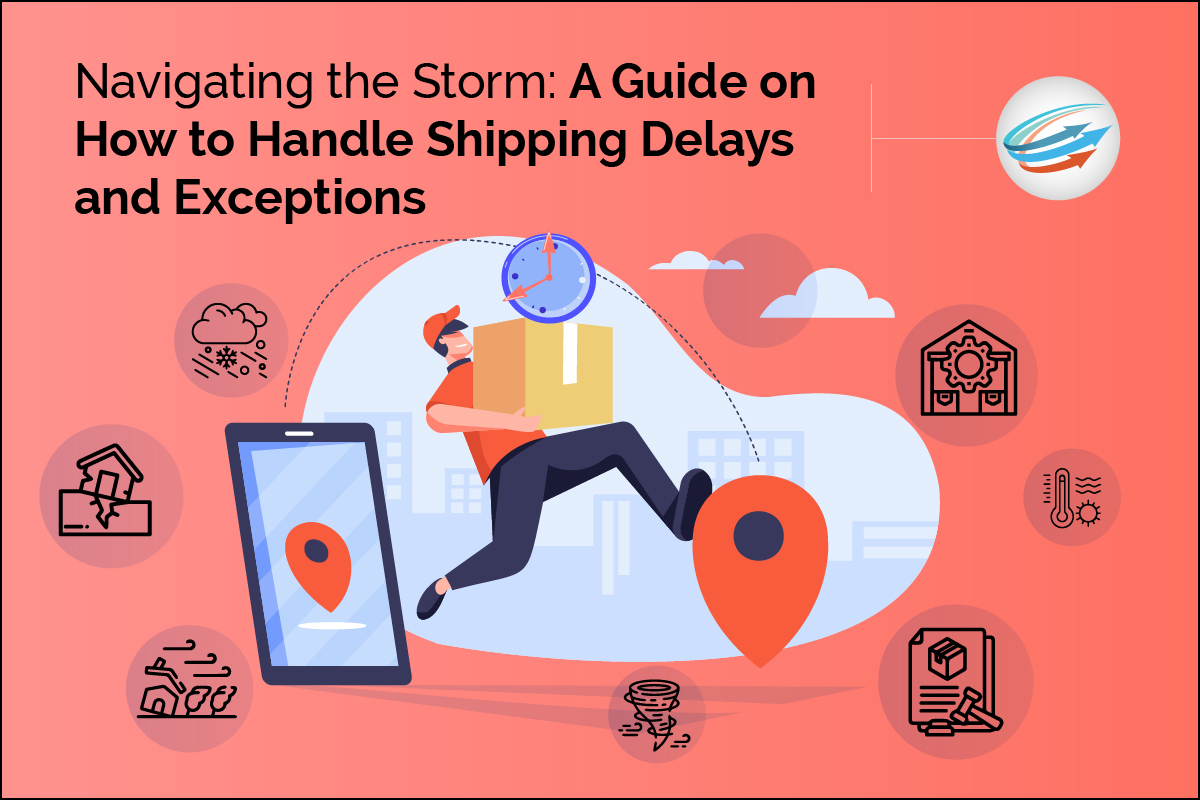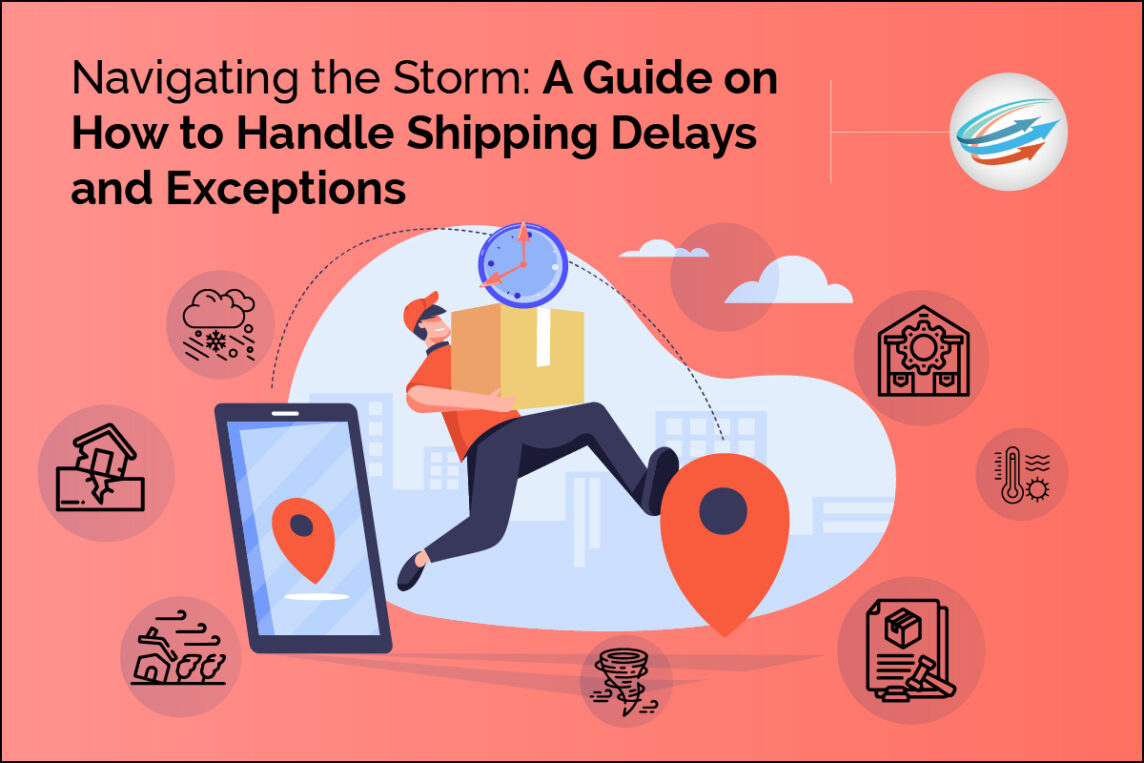
As we edge closer to 2024, navigating the logistics landscape has become an increasingly complex challenge. With supply chain disruptions and shipping exceptions becoming more prevalent, businesses need to be equipped with the right tools and strategies to remain competitive and maintain customer satisfaction.
In this guide, we’ll discuss actionable tips for how to handle shipping delays and exceptions. From preemptive planning to transparent communication, these tips will help mitigate the impact of disruptions and keep your business on track.
Understanding Common Causes of Shipping Delays
So what exactly causes shipping delays and supply chain disruptions? Below are some of the most common causes of shipping delays.
Weather-Related Disruptions
Adverse weather conditions can have a significant impact on shipping operations, leading to delays and disruptions in the supply chain. Heavy rainfall, snowstorms, strong winds, and extreme temperatures can all contribute to delays in shipping times. In addition, natural disasters such as hurricanes or earthquakes can cause widespread damage to the infrastructure of ports and other areas of the supply chain network.
Carrier Delays and Issues
Shipping carriers may also experience internal problems that can lead to delays in shipments. These issues can include maintenance needs, workforce shortages, or technical glitches that prevent carriers from operating at full capacity. If these problems are not addressed quickly, they can cause significant delays in delivery times for customers.
Related: Shipping Carrier Showdown: Comparing USPS, UPS, and FedEx
Customs and Regulatory Delays
Customs and regulatory processes are also a common cause of shipping delays. Goods must be cleared by customs before they can be transported across international borders and this process often takes time due to the paperwork involved. In addition, many countries have specific regulations that must be followed when transporting goods through their borders which may add further delay to shipments.
Supplier and Inventory Challenges
Delays at the supplier level can also cause disruption throughout the supply chain network as orders cannot be fulfilled until materials arrive from suppliers. Additionally, inventory issues such as incorrect stock levels or out-of-stock items can lead to delays in shipments as customers wait for products to become available again before they are shipped out.
Strategies for Resolving Shipping Delays and Exceptions
Below are five strategies to help resolve shipping delays and exceptions.
Set Clear Expectations with Customers
When it comes to resolving shipping delays and exceptions, one of the most effective strategies is setting clear expectations with customers. This means providing transparent communication on potential delays and offering realistic delivery timeframes. Additionally, it’s important to provide tracking and status updates to customers so they can stay informed throughout the process. Doing so helps to ensure that customers are aware of any potential delays and improves customer satisfaction.
Employ Proactive Communication Strategies
Having a proactive communication strategy in place is essential for addressing shipping delays and exceptions. This includes implementing automated notification systems that can alert customers when their order has been delayed or is experiencing an exception. Crafting empathetic and informative delay messages is also important, as this helps to reassure customers that their order is being taken care of.
Collaborate with Shipping Partners
Collaborating with shipping partners involves discussing the process of working with shipping carriers to resolve issues and expedite delivery, as well as exploring options for rerouting shipments or arranging alternative delivery methods if necessary. Having an open dialogue between shippers and carriers helps to ensure that any issues are addressed quickly and efficiently and can improve supply chain optimization.
Offer Customer Incentives and Support
In addition to collaborating with carriers, it is also important to offer incentives or support for customers affected by shipping delays or exceptions. This could include discounts or refunds on delayed orders, priority shipping on future orders, or establishing a responsive customer support team for inquiries related to delayed shipments. Taking steps like these can help show customers that you value their business even during difficult times.
Implement a Robust Inventory Management System
By ensuring accurate real-time inventory tracking, companies can quickly identify and address potential issues before they turn into costly delays. Additionally, utilizing safety stock to buffer against delays can help prevent disruptions in the supply chain. Finally, implementing demand forecasting for proactive logistics management can provide crucial insights into future needs, allowing companies to make informed decisions and avoid delays.
Trust APS Fulfillment, Inc. to Help You Handle Shipping Delays and Exceptions
Supply chain disruptions can lead to frustrated customers and a damaged business reputation. To proactively prevent these issues, it’s important to have a solid plan in place that includes effective communication and prompt resolution. But managing shipping can be complex, which is where APS Fulfillment, Inc. comes in.
With expertise in supply chain optimization and logistics management, we’re the ideal partner to help your business navigate the challenges of shipping and keep your customers satisfied. Trust APS Fulfillment to provide the shipping management solutions you need to protect your business and deliver exceptional customer service.
Get in touch with us today and one of our consultants will tailor a fulfillment plan that will help grow your business. To book a consultation, call (954) 582-7450 or email [email protected].





